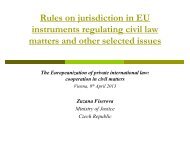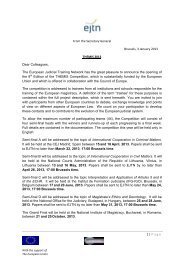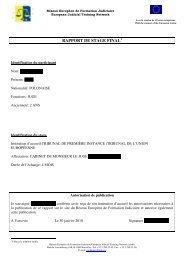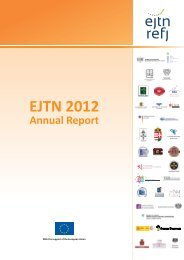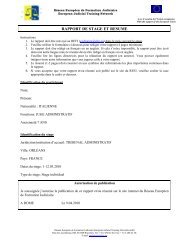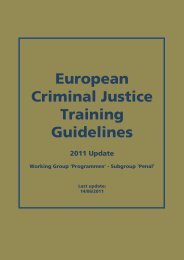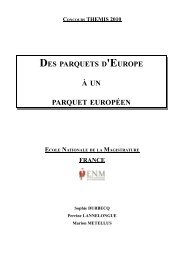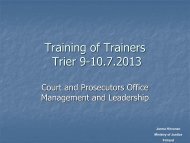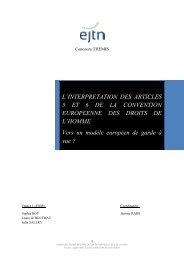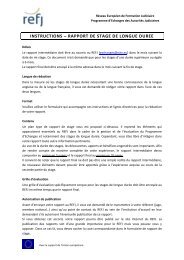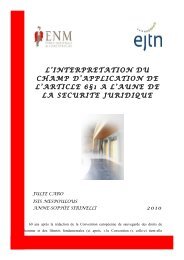BE_2011_GE_en - European Judicial Training Network
BE_2011_GE_en - European Judicial Training Network
BE_2011_GE_en - European Judicial Training Network
You also want an ePaper? Increase the reach of your titles
YUMPU automatically turns print PDFs into web optimized ePapers that Google loves.
<strong>European</strong> <strong>Judicial</strong> <strong>Training</strong> <strong>Network</strong><br />
Exchange Programme for <strong>Judicial</strong> Authorities<br />
REPORT ON THE EXCHAN<strong>GE</strong> AND SUMMARY<br />
Réseau Europé<strong>en</strong> de Formation Judiciaire/<strong>European</strong> <strong>Judicial</strong> <strong>Training</strong> <strong>Network</strong> (aisbl)<br />
Rue du Luxembourg 16B, B-1000 Bruxelles; Tel: +32 2 280 22 42; Fax: + 32 2 280 22 36;<br />
E-mail: exchanges@ejtn.eu<br />
With the support of the <strong>European</strong> Union<br />
Instructions:<br />
1. The report must be s<strong>en</strong>t to the EJTN (exchanges@ejtn.eu) within one month after the exchange.<br />
2. Please use the template below to write your report (recomm<strong>en</strong>ded l<strong>en</strong>gth: 4 pages).<br />
3. Please write in English or Fr<strong>en</strong>ch. Should this not be possible, the report can be writt<strong>en</strong> in another language<br />
but the summary must be in English or Fr<strong>en</strong>ch.<br />
4. Please read the guidelines for drafting the report (in Annex). Feel free to add any other relevant information<br />
in your report.<br />
5. The summary shall contain a synthesis of the most important information of the report.<br />
6. Please note that NO NAMES, neither yours nor the ones of the persons you met during your exchange,<br />
should appear in the report in order to <strong>en</strong>sure anonymity 1 . Initials can be used wh<strong>en</strong> necessary.<br />
Id<strong>en</strong>tification of the participant<br />
Name:<br />
First name:<br />
Nationality: Belgian<br />
Country of exchange: Danmark<br />
Publication<br />
For dissemination purposes and as information for future participants in the Programme please<br />
take note that, unless you indicate otherwise, EJTN may publish your report in its website. In this<br />
case the report will remain anonymous and your name and surname will not appear. To this aim,<br />
please do not m<strong>en</strong>tion any names in the reports. Initials can be used instead.<br />
Please tick this box if you do not wish for your report to be published<br />
For completion by EJTN staff only<br />
Publication refer<strong>en</strong>ce:<br />
1 To that purpose, the first page of this report will be tak<strong>en</strong> out before any possible publication<br />
For completion by EJTN staff only
Id<strong>en</strong>tification of the participant<br />
Nationality: Belgian<br />
Functions: Judge at the District Court of Antwerp<br />
L<strong>en</strong>gth of service: 17 years<br />
Id<strong>en</strong>tification of the exchange<br />
Hosting jurisdiction/institution: Fredriksberg District Court<br />
City: Cop<strong>en</strong>hag<strong>en</strong><br />
Country: D<strong>en</strong>mark<br />
Dates of the exchange: <strong>2011</strong>.10.31 – <strong>2011</strong>.11.10<br />
Type of exchange:<br />
one to one exchange x group exchange<br />
With the support of the <strong>European</strong> Union<br />
Publication refer<strong>en</strong>ce:<br />
g<strong>en</strong>eral exchange specialized exchange (please specify : )<br />
I. Programme of the exchange.<br />
REPORT<br />
At the first day of the exchange the participants were briefly introduced in the g<strong>en</strong>eral organization of the<br />
judicial system of D<strong>en</strong>mark, as well as in the structure and functions of the hosting organization, the<br />
District Court of Fredriksberg in Cop<strong>en</strong>hag<strong>en</strong>.<br />
During the exchange we had very instructive contacts with the presid<strong>en</strong>t of the Court, with two of the<br />
deputy judges and several executive judges. All of these colleagues were very op<strong>en</strong>-minded and willing to<br />
discuss their experi<strong>en</strong>ces with the participants. Simultaneously there was a lively exchange of experi<strong>en</strong>ces<br />
amongst the participants who came from various countries: the Czech Republic, Spain, Italy, Austria and<br />
Belgium.<br />
Each time before att<strong>en</strong>ding to a hearing, a brief introduction was offered by one of the deputy judges.<br />
We were giv<strong>en</strong> the opportunity to observe a civil law hearing in the small claims court, some criminal<br />
cases with lay judges, a criminal law hearing dealing with custody before trial demands, and at the<br />
hosting locality of Glostrup District Court, a criminal jury trial. Last but not least is to be m<strong>en</strong>tioned that<br />
we witnessed how at the bailiff’s court of Fredriksberg the public auction of a seized is dealt with. It was<br />
<strong>European</strong> <strong>Judicial</strong> <strong>Training</strong> <strong>Network</strong><br />
Exchange Programme for <strong>Judicial</strong> Authorities
eally unexpected that this auction takes place in the courtroom itself, as well as it was surprising that the<br />
bailiff-judge himself is charged with the practical handling of seizing a debtors belongings in his home<br />
place at 5 o’clock a.m. A more close relationship betwe<strong>en</strong> the judge and the public can hardly be<br />
imagined.<br />
Apart from these activities at the hosting court itself, our Danish colleagues accompanied us to several<br />
organizations and persons, such as:<br />
- the houses of Parliam<strong>en</strong>t;<br />
- two law firms. The first one occupied mainly with labor law, the second mainly with civil and<br />
administrative law;<br />
- the Supreme court, where there was no activity at the time of our visit, but nevertheless we where<br />
shown around in the building and we got quite an interesting introduction in the way this court is<br />
organized;<br />
- one prison, called Vestre Fa<strong>en</strong>gsel, where the prisoners mainly are staying in custody awaiting<br />
trial. These prisoners might not realize that, however they are incarcerated, their situation<br />
compared to practices in other <strong>European</strong> countries, is quite privileged because the prison is not<br />
overcrowded at all, and therefore substantial efforts to supply their social situation can be made;<br />
- the Danish Court Administration, where we received a lot of background information about the<br />
careers of judges and about the huge reorganization witch has tak<strong>en</strong> place in the judicial system in<br />
the last five years;<br />
- the Danish Institute for Human Rights, which appeared to be a very active observatory on Human<br />
Rights issues, both on the national and the international plan.<br />
II. The hosting institution.<br />
The Fredriksberg District court is one of the 24 Danish District Courts. It is a first instance Court dealing<br />
with both civil and criminal law cases. The verdicts of this District Court can be appealed to one of the<br />
two divisions of the High Court (Eastern Division), and than again to the Supreme Court. Wh<strong>en</strong> in civil<br />
law matters very principal questions have to be decided, the District Court can refer the case directly to<br />
the High Court without itself deciding the case.<br />
The civil law division of the District court is composed of two <strong>en</strong>tities: the small-claims court, and the<br />
ordinary civil law court for more serious cases. Apart from these <strong>en</strong>tities there is the bailiff’s court,<br />
exclusively compet<strong>en</strong>t for seizing matters and public auctions.<br />
For criminal cases three <strong>en</strong>tities again. First of all, the criminal division with only one judge, for small<br />
cases (fines & cases where the def<strong>en</strong>dant is pleading guilty). Second: the criminal law court composed of<br />
one judge and 2 laym<strong>en</strong>, for more severe cases (up to 4 years in prison). And last: for the most severe<br />
cases (max. lifetime imprisonm<strong>en</strong>t), composed of 3 judges and 6 jurors. The counterpart of the bailiff’s<br />
court in civil law matters is to be found in the criminal law division, in a court called ‘Dommervagt<strong>en</strong>’,<br />
which is a court exclusively compet<strong>en</strong>t for custody affairs and coercive measures that can be ordered in<br />
the completion of criminal investigations. This court can be applied to 24 hours a day. To <strong>en</strong>able its<br />
perman<strong>en</strong>t availability, ‘Dommervagt<strong>en</strong>’ is driv<strong>en</strong>, in cooperation and on turn, by judges of Fredriksberg<br />
District court and judges of Cop<strong>en</strong>hag<strong>en</strong>’s First District Court.<br />
To manage its differ<strong>en</strong>t responsibilities, the District Court of Fredriksberg is composed - apart from the<br />
administrative staff - of 1presid<strong>en</strong>t, 12 other judges, 15 deputy judges, and approximately 80 civil<br />
servants who can be called to duty as layman.<br />
III. The law of the host country.<br />
With the support of the <strong>European</strong> Union<br />
<strong>European</strong> <strong>Judicial</strong> <strong>Training</strong> <strong>Network</strong><br />
Exchange Programme for <strong>Judicial</strong> Authorities
Our special att<strong>en</strong>tion was drawn to the Administration of Justice act of 2006, june 8 th .(lov nr. 538 om<br />
politi- og domstolsreform<strong>en</strong>). Together with another huge law on the reorganization of the administration<br />
of municipalities, this law has thoroughly changed the fundam<strong>en</strong>tal structures of the judiciary<br />
organization. This law comprises on the one hand an <strong>en</strong>largem<strong>en</strong>t of the operational scale of police forces<br />
and on the other hand an <strong>en</strong>largem<strong>en</strong>t of the area of territorial compet<strong>en</strong>ce of the District Courts.<br />
Formerly D<strong>en</strong>mark counted 82 juridical districts with a District Court in each of them. This situation<br />
created a wide variety of differ<strong>en</strong>t practices in handling both criminal as civil law cases. Furthermore a<br />
series of District Courts appeared to be too small to <strong>en</strong>sure the in-service training of younger judges.<br />
Moreover, some of these District Courts where situated at a far-off countryside, which was experi<strong>en</strong>ced to<br />
be disadvantageous for attracting younger judges, and thus trued the continuity of judicial services. To<br />
this situation was put an <strong>en</strong>d by the Administration of Justice act, whose main feature is to reduce the<br />
number of District Courts to 24 by <strong>en</strong>larging the scale of the districts.<br />
After a few years of practicing in these new structures, we were <strong>en</strong>sured by the Danish Court<br />
Administration that the over-all evaluation is very positive. A fabulous work has be<strong>en</strong> done to make this<br />
come through, but, as we were told by our colleagues at the Fredriksberg District Court as well, it was<br />
worth the <strong>en</strong>gagem<strong>en</strong>t of everyone cooperating for a more effici<strong>en</strong>t structure and finally, a better service<br />
for the public in g<strong>en</strong>eral.<br />
IV. The comparative law aspect in the exchange.<br />
Most appar<strong>en</strong>t differ<strong>en</strong>ces from the system in our country:<br />
- g<strong>en</strong>erally:<br />
A very informal way of communication betwe<strong>en</strong> judges, lawyers and cli<strong>en</strong>ts. No robes are used, no pomp<br />
and circumstances.<br />
- civil law:<br />
1. Before cases are brought to a hearing in the small claims court, there is a preparatory procedure during<br />
which the judge is contacting parties in order to try to settle the case by alternative dispute resolution.<br />
This might either be by just convincing them or realistically confronting them with<br />
all relevant aspects of their situation, or by referring them to mediation. Only if this preparatory procedure<br />
does not lead to a settlem<strong>en</strong>t, the case will be pleaded in the courtroom. In such cases, the judge who has<br />
conducted the preparatory procedure can decide either to withdraw - and than be replaced by a colleague -<br />
or to treat the case in court.<br />
2. In the small claims court, individuals can merely address themselves to the court administration with<br />
any judicial problem, without assistance of a lawyer, and just by ev<strong>en</strong> orally explaining what bothers<br />
them. In such cases the adverse party will be invited by the judge, who will start a preparatory procedure,<br />
such as described above sub nr. 1.<br />
3. Wh<strong>en</strong> new and very principle questions have to be dealt with, the District Court can decide to refer the<br />
case directly to the High Court. This is inspired of course by the concern of unification, but on the other<br />
hand it seems to cause the loss of an instance for the parties involved.<br />
- criminal law:<br />
With the support of the <strong>European</strong> Union<br />
<strong>European</strong> <strong>Judicial</strong> <strong>Training</strong> <strong>Network</strong><br />
Exchange Programme for <strong>Judicial</strong> Authorities
1. At the level of the District Court, the attorney is a member of the police forces. Moreover, in the<br />
practical arrangem<strong>en</strong>t of the courtroom, the Public Prosecutor <strong>en</strong>ters the courtroom just as any other civil<br />
person, and he takes place opposite to the def<strong>en</strong>dant, at the same level as the def<strong>en</strong>dant. This creates a<br />
g<strong>en</strong>eral perception of equality of arms, and indep<strong>en</strong>d<strong>en</strong>ce of the judicial authority.<br />
2. It is a very democratic way of thinking to use laym<strong>en</strong> as assistants of the judges in most criminal cases.<br />
V. <strong>European</strong> aspect.<br />
The Council of Europe Recomm<strong>en</strong>dation no. R (99) 12 on Mediation in P<strong>en</strong>al Matters has only rec<strong>en</strong>tly<br />
led to law nr. 467 of 2009.06.12, called ‘Lov om Konfliktraad’. This law organises the conflict-council<br />
that administers mediation units at the level of local police forces, for mediation in criminal cases. The<br />
g<strong>en</strong>eral feeling is, that in Danish society there is a long tradition of solving social problems by discussion<br />
rather than by force and confrontation. Mediation and alternative conflict resolution is an important task<br />
of deputy judges in the civil small claims court.<br />
Very much att<strong>en</strong>tion is paid to transpar<strong>en</strong>cy, contradiction, fair and expedi<strong>en</strong>t trial. This all is in high<br />
degree a way of living up to human rights such as they are consecrated in the <strong>European</strong> Declaration of<br />
Human Rights.<br />
In our eyes, the quality of the p<strong>en</strong>it<strong>en</strong>tiary regime in Vestre Fa<strong>en</strong>gsel could certainly pass for a model for<br />
many prisons throughout the <strong>European</strong> countries.<br />
VI. The b<strong>en</strong>efits of the exchange.<br />
The experi<strong>en</strong>ces of the exchange <strong>en</strong>courage me to develop a more informal way of communicating on<br />
judicial affairs, than I was used to before. But of course, traditional structures put limits to sharply<br />
altering all practices, and a certain distance will always be mandatory.<br />
All for the rest, and ev<strong>en</strong> though I tell my colleagues about my experi<strong>en</strong>ces, I am not<br />
convinced of any transfer of my personal b<strong>en</strong>efits to their own way of functioning.<br />
VII. Suggestions.<br />
The Exchange Programme is a beautiful instrum<strong>en</strong>t to stimulate the understanding betwe<strong>en</strong> colleagues<br />
from all nationalities. The administration and organization of the programme is very effici<strong>en</strong>t and userfri<strong>en</strong>dly.<br />
I was very pleased to be able to participate. I don’t have any suggestions for improvem<strong>en</strong>t. It’s<br />
perfect like it is.<br />
My only concern: if this report would be published in any way, please would you previously be so kind to<br />
clean up my secondary school English.<br />
With the support of the <strong>European</strong> Union<br />
<strong>European</strong> <strong>Judicial</strong> <strong>Training</strong> <strong>Network</strong><br />
Exchange Programme for <strong>Judicial</strong> Authorities
With the support of the <strong>European</strong> Union<br />
SUMMARY<br />
The hosting organisation of the exchange in Cop<strong>en</strong>hag<strong>en</strong>, from <strong>2011</strong>.10.31 until <strong>2011</strong>.11.10, was the<br />
Fredriksberg District Court. This is a typical first instance court, dealing with both civil and criminal law<br />
cases. We were briefly introduced into the judicial systems that are relevant for this court. Furthermore<br />
we had the opportunity to be pres<strong>en</strong>t at a series of public hearings. Each time we were informed about the<br />
headlines of the cases to be treated, so as a result of the exchange we acquired quite an idea of the g<strong>en</strong>eral<br />
way things do run in the administration of this Court.<br />
Other institutions and persons were visited as well, such as a prison, two law firms, the locations of the<br />
High Court and the Parliam<strong>en</strong>t, the Danish Institute for Human Rights and the Danish Court<br />
Administration.<br />
The over-all impression is that the communication in the judicial system is very informal. Emphasize lays<br />
on basic principles like contradiction, fair trial and equality of arms betwe<strong>en</strong> def<strong>en</strong>dant and Public<br />
Prosecutor. There is a culture of trying to settle conflicts in ways of alternative dispute resolution. This is<br />
ev<strong>en</strong> an important part of the core business of the deputy judges in the small claims civil court.<br />
The Administration of Justice act of 2006, June 8 th introduced a fundam<strong>en</strong>tal reorganization of the<br />
judicial system. The main feature of this act is the <strong>en</strong>largem<strong>en</strong>t of the territorial compet<strong>en</strong>ce area of the<br />
District Courts, of which the number has be<strong>en</strong> reduced from 82 to only 24 nowadays. The greatest<br />
b<strong>en</strong>efits of this new structure are unification of judicial practices, offering more training opportunities for<br />
younger judges and making the career more attractive for them, thus <strong>en</strong>suring the continuity of public<br />
service in judicial affairs.<br />
The Danish system complies very well with international standards consecrated in the <strong>European</strong><br />
Declaration of Human Rights. Mediation is a part of the culture, predominantly in civil matters. For what<br />
we have se<strong>en</strong>, prison conditions seem to correspond to a high standard.<br />
<strong>European</strong> <strong>Judicial</strong> <strong>Training</strong> <strong>Network</strong><br />
Exchange Programme for <strong>Judicial</strong> Authorities



